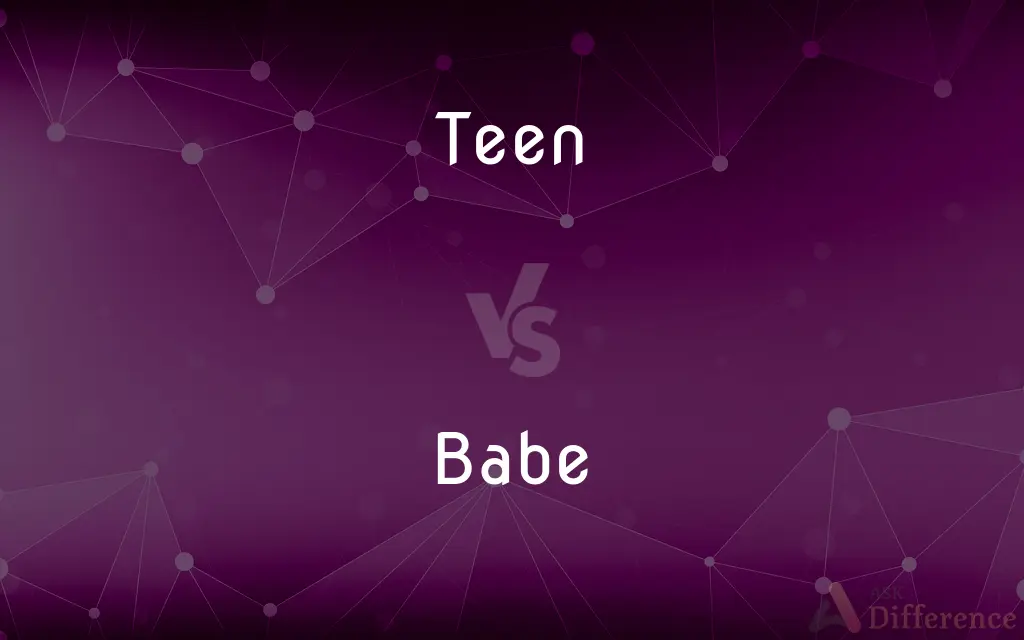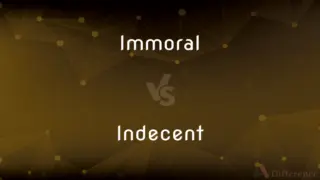Teen vs. Babe — What's the Difference?
By Fiza Rafique & Urooj Arif — Updated on March 16, 2024
"Teen" refers to someone aged 13-19, focusing on a life stage. "Babe" is colloquial, either for a young child or affectionately for adults, emphasizing relationships or attractiveness.

Difference Between Teen and Babe
Table of Contents
ADVERTISEMENT
Key Differences
A "teen" specifically identifies individuals in the adolescent age range of 13 to 19 years, characterized by significant physical, emotional, and social development. Whereas "babe" has dual common uses: it refers to young infants, highlighting their early life stage, and is also used affectionately towards adults, often in romantic contexts, without implying age.
The term "teen" is rooted in describing a period of life that bridges childhood and adulthood, associated with high school education, puberty, and the beginning of legal responsibilities in many cultures. On the other hand, when "babe" is used to describe a young child, it emphasizes innocence and dependency, while its use among adults can signify endearment or physical attraction, depending on context.
Cultural representations often associate "teens" with themes of rebellion, self-discovery, and coming-of-age experiences, reflecting societal views on adolescence. In contrast, "babe" as an affectionate term conveys closeness and intimacy in personal relationships, or when referring to infants, it captures the nurturing aspects of early childhood.
While "teen" has a clear and universally accepted definition, "babe" carries more nuanced meanings that vary significantly with context, tone, and relationship dynamics. This variability makes "babe" versatile in informal speech but potentially ambiguous without additional information.
The societal roles and expectations for "teens" are significantly shaped by their age group, focusing on education, socialization, and gradual assumption of adult responsibilities. "Babe," however, reflects different societal views depending on its use: care and protection for infants, or personal affection in adult relationships.
ADVERTISEMENT
Comparison Chart
Definition
An individual aged 13 to 19 years.
A young child or an affectionate term for an adult.
Age Focus
Specific: Adolescence.
Variable: Infancy or no specific age in affectionate use.
Context
Developmental stage, educational and social focus.
Early childhood or personal relationships.
Cultural Connotation
Associated with adolescence, growth, and change.
Dual: Innocence and dependency or affection and attractiveness.
Usage
Universal and specific to age.
Context-dependent, varies between personal and general use.
Compare with Definitions
Teen
A demographic targeted by certain products and media.
This new app is extremely popular among teens.
Babe
A term of endearment for a romantic partner.
He called her babe affectionately.
Teen
Someone experiencing significant growth and change.
As a teen, he explored various hobbies and interests.
Babe
An informal term for a very young child.
The babe slept peacefully in her crib.
Teen
A stage characterized by puberty and high school.
Teens often face significant academic and social pressures.
Babe
Used to denote attractiveness in colloquial speech.
She's universally regarded as a babe due to her striking features.
Teen
An individual within the 13-19 age range.
She became more independent during her teen years.
Babe
A word indicating closeness in a relationship.
They often use babe as a sign of their affection.
Teen
The period of transitioning from childhood to adulthood.
Her teen years were marked by remarkable personal development.
Babe
Reflecting care and protection when referring to infants.
The newborn babe was the center of everyone's attention.
Teen
The numbers 10 through 19 or 13 through 19.
Babe
A sexually attractive young woman
He's been pumping up his pecs to impress the babes
Teen
The 10th through 19th items, in a series or scale
The temperature was in the low teens.
Babe
An affectionate form of address, typically for someone with whom one has a sexual or romantic relationship
Hey babes, I know it is unscrupulous and underhand, but don't blame me!
It was the best day of my life—except for meeting you, babe
Teen
The 13th through 19th years of a person or animal's life
Students in their teens.
Babe
A baby
You have a babe, who will surely be treated as a king when he grows
Teen
A teenager.
Babe
A baby; an infant.
Teen
Misery; grief.
Babe
An innocent or naive person.
Teen
Teenage.
Babe
(Slang) A person considered to be sexually attractive.
Teen
Synonym of teenager: a person between 13 and 19 years old.
Babe
(Informal) Sweetheart; dear. Used as a term of endearment.
Teen
(archaic) Grief; sorrow; trouble.
Babe
A baby or infant; a very young human or animal. 14
These events came to pass when he was but a babe.
Teen
Vexation; anger; hate.
Babe
(slang) An attractive person, especially a young woman. 20
She's a real babe!
Teen
Of or having to do with teenagers; teenage
Teen fashion
Babe
(affectionate) Darling term of endearment.
Hey, babe, how's about you and me getting together?
Teen
To excite; to provoke; to vex; to afflict; to injure.
Babe
An infant; a young child of either sex; a baby.
Teen
To become angry or distressed.
Babe
A doll for children.
Teen
To close, to shut; to enclose, to hedge or fence in.
Babe
A very young child (birth to 1 year) who has not yet begun to walk or talk;
Isn't she too young to have a baby?
Teen
Grief; sorrow; affiction; pain.
With public toil and private teenThou sank'st alone.
Teen
A teenager.
Teen
To excite; to provoke; to vex; to affict; to injure.
Teen
To hedge or fence in; to inclose.
Teen
Being of the age 13 through 19;
Teenage mothers
The teen years
Common Curiosities
What defines a teen?
A teen is defined as an individual aged between 13 and 19 years, representing the adolescent stage of development.
How is "babe" used in different contexts?
"Babe" can refer to a young child or be used as a term of endearment towards adults, with meanings varying based on context.
What cultural associations do teens have?
Teens are often associated with growth, self-discovery, and the challenges of transitioning from childhood to adulthood.
How do societal expectations differ for teens and babes?
Societal expectations for teens often involve education and social development, while for babes, they focus on care and nurturing.
Are the terms "teen" and "babe" interchangeable?
No, these terms are not interchangeable as they refer to different age groups and contexts.
Why might someone use "babe" in a relationship?
"Babe" is used in relationships to express affection, intimacy, or attraction.
Can "babe" be considered a term of affection?
Yes, "babe" is commonly used as a term of affection, particularly in romantic relationships.
What aspects of life are significant during the teen years?
Significant aspects include educational achievements, social relationships, and personal development.
Is "babe" appropriate for describing all children?
While "babe" can describe young children, its appropriateness depends on cultural and personal preferences.
What challenges do teens face?
Teens face challenges related to identity, peer pressure, academic expectations, and navigating the transition to adulthood.
What age group does "teen" specifically refer to?
The term "teen" specifically refers to individuals aged 13 to 19 years.
Can "babe" be used in formal contexts?
"Babe" is generally considered informal and is rarely appropriate in formal contexts.
What makes the teen years unique?
The teen years are unique due to the significant physical, emotional, and social changes that occur during this period.
How do perceptions of "babe" differ across cultures?
Perceptions of "babe" differ widely, influenced by cultural norms regarding affection, child-rearing, and language use.
How does the usage of "babe" vary?
The usage of "babe" varies widely, from indicating affection in personal relationships to describing someone's appearance in informal speech.
Share Your Discovery

Previous Comparison
Believe vs. Buy
Next Comparison
Immoral vs. IndecentAuthor Spotlight
Written by
Fiza RafiqueFiza Rafique is a skilled content writer at AskDifference.com, where she meticulously refines and enhances written pieces. Drawing from her vast editorial expertise, Fiza ensures clarity, accuracy, and precision in every article. Passionate about language, she continually seeks to elevate the quality of content for readers worldwide.
Co-written by
Urooj ArifUrooj is a skilled content writer at Ask Difference, known for her exceptional ability to simplify complex topics into engaging and informative content. With a passion for research and a flair for clear, concise writing, she consistently delivers articles that resonate with our diverse audience.















































